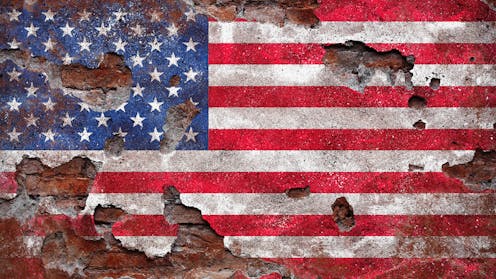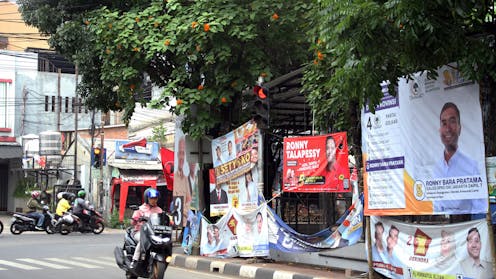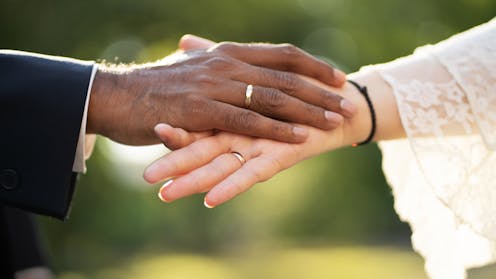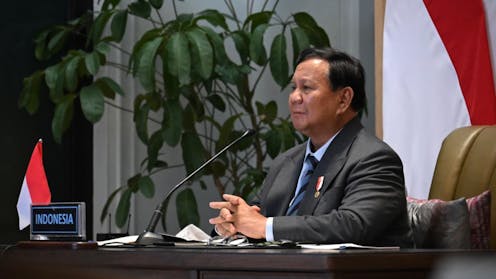Harvard, like all Americans, can’t be punished by the government for speaking freely – and a federal court decision upholds decades of precedents saying so
- Written by Stephanie A. (Sam) Martin, Frank and Bethine Church Endowed Chair of Public Affairs, Boise State University

When the federal government threatened to cancel billions in research funds[1] from Harvard University – as it has also done to other research universities[2] – the message was clear: Institutions that speak or think in ways elected officials dislike can expect to pay a price.
But in a recent ruling that underscored a principle at the heart of American democracy[3], a federal judge struck down the Trump administration’s move[4]. The “government-initiated onslaught against Harvard was much more about promoting a governmental orthodoxy in violation of the First Amendment[5] than about anything else,” U.S. District Judge Allison Burroughs wrote.
The Harvard controversy began when the Trump administration announced plans to cut off billions in federal research funds because it objected to the university’s[6] public positions, campus culture and some of its academic scholarship. No one contended that Harvard had mismanaged money or failed to meet grant requirements.
Instead, the White House said the school had done too little to eliminate so-called woke diversity, equity and inclusion – DEI – policies and alleged that antisemitism proliferated on campus, as evidenced by student demonstrations against Israel’s conduct in the Gaza war.
Along with the American Association of University Professors[7], Harvard filed suit in response to the funding cuts[8], arguing that the administration’s action was punitive and unconstitutional – a textbook case of retaliation. By canceling funding, the government was deploying financial pressure to silence disfavored speech.
White House Press Secretary Karoline Leavitt on April 15, 2025, spoke about President Donald Trump’s moves against Harvard.Protection for dissent and disagreement
In striking down the funding cut, Burroughs ruled that the administration’s move violated the First Amendment[9]. The First Amendment protects freedom of speech, press, religion and assembly[10] by limiting government intrusion. While government officials may disagree with Harvard’s speech – whether that means faculty scholarship, public statements or the culture of campus debate – they cannot retaliate by pulling federal support, the judge wrote.
As chair[11] of a public policy institute[12] devoted to strengthening deliberative democracy, I have written two books about[13] the media and the presidency[14], and another about media ethics[15]. My research traces how news institutions shape civic life and why healthy democracies rely on free expression.
The principle at work in the Harvard case is simple: Free speech protections don’t just apply to individuals in the town square or in places where public decisions are being made.
First Amendment rights extend to private institutions, even when their views or policies contravene official government opinions, and even when they receive funding from the government. Government reprisal does more than chill speech – it sets up a system where only state-approved viewpoints can flourish.
Supreme Court has seen this before
The ruling in Harvard’s favor follows a long legal tradition of Supreme Court rulings that bar the government from demanding ideological acquiescence in exchange for support.
In the case Speiser v. Randall[16] that was decided in 1958, the court struck down a California law requiring veterans to sign loyalty oaths to receive tax exemptions. The decision created the doctrine of unconstitutional conditions[17], a principle that forbids government from making the receipt of a government benefit or entitlement conditional in a way that interferes with the exercise of a constitutional right.
In Perry v. Sindermann[18], a 1972 decision, a professor was denied reappointment at a state college after criticizing administrators. Even without tenure, the court held, the government could not retaliate against him for protected speech.
And in Legal Services Corp. v. Velazquez[19], the court in 2001 invalidated restrictions that barred federally funded legal aid lawyers from challenging welfare laws. Justice Anthony Kennedy wrote that such limits “distort the legal system” by preventing some members of the bar from making arguments on behalf of their clients, while the government would face no similar restriction in promoting their own views.
Supreme Court’s contemporary signals
More recent cases show the court wrestling with the same question in new contexts.
The court’s 2013 decision in Agency for International Development v. Alliance for Open Society International[21] struck down a requirement that nonprofits adopt a government-approved position opposing prostitution in order to receive global health funding.
The government, Chief Justice John Roberts wrote, could not make program funds dependent on grant-seeking groups adopting particular political or moral beliefs. In this case, that meant the Alliance for Open Society did not have to condemn sex work in order to qualify for public health funding.
Likewise, in Janus v. AFSCME[22] from 2018, the court struck down an Illinois law that required public employees who chose not to join a union to still pay fees to support it. The state had argued that these “fair-share fees” were necessary because unions bargain on behalf of all workers. But the court said that forcing nonmembers to pay was a form of compelled speech – subsidizing union political organizing – that abridged the First Amendment.
While the context is very different from Harvard’s funding dispute, both cases highlight the same principle: The government cannot use money – whether through subsidies, grants or mandatory fees – as a way to compel or suppress expression. These rulings show that the First Amendment protections apply to government funding and policy questions that quietly shape who gets heard and who does not.
Long history of retaliation
While American myth celebrates the idea that the United States welcomes dissent[23], the government has a history of punishing protesters.
The Alien and Sedition Acts of 1798[24] criminalized criticism of the federal government. During World War I, the Espionage and Sedition Acts[25] were used to imprison activists and silence newspapers. In the 1950s, Sen. Joseph McCarthy’s crusade against alleged communists[26] extended to universities, with faculty losing jobs and having their careers destroyed.
In each of those episodes, dissent was framed as dangerous to national security or social stability. And in each case, the tools of government – whether criminal law, congressional investigations or funding threats – were used to discipline voices that strayed from the party line. The impulse to punish institutions for perceived ideological deviance is part of a recurring American story.
What’s distinctive today is how the tactic has been folded into the culture wars.
Where earlier generations of politicians used criminal prosecution or loyalty oaths, the contemporary fight often plays out in budget spreadsheets. Defund public radio[27]. Cut university budgets[28]. Zero out grants to the arts[29].
These are not just fiscal decisions; they are symbolic moves aimed at disciplining institutions seen by conservatives as too liberal or too critical.
Why this matters beyond the courts
The latest ruling may protect Harvard in this instance, but the larger conflict is not going away.
The legal decision confirms that retaliation violates the First Amendment, but political leaders may continue to test the boundaries. And among the public[31], the idea that universities should play along with official doctrine in exchange for continued government funding may eventually gain traction. That possibility feels especially real given Trump’s promises, echoed by Vice President JD Vance and White House Deputy Chief of Staff Stephen Miller, to wield federal power against[32] universities and civic groups they portray – often inaccurately – as leftist, radical or violent.
A society where public funding flows only to institutions aligned with those in power is not a free society. It’s one where government can shape the landscape of knowledge and debate to its own ends.
The Harvard decision offers a reminder: The First Amendment is not just about the right to speak without fear of jail. It’s also about ensuring that the government cannot punish speech indirectly by threatening livelihoods and institutions. That’s why this case matters to the future of free expression in American democracy.
References
- ^ threatened to cancel billions in research funds (www.npr.org)
- ^ other research universities (whyy.org)
- ^ underscored a principle at the heart of American democracy (www.pbs.org)
- ^ struck down the Trump administration’s move (www.harvard.edu)
- ^ promoting a governmental orthodoxy in violation of the First Amendment (storage.courtlistener.com)
- ^ objected to the university’s (www.bbc.com)
- ^ American Association of University Professors (www.aaup.org)
- ^ filed suit in response to the funding cuts (www.aaup.org)
- ^ move violated the First Amendment (www.pbs.org)
- ^ freedom of speech, press, religion and assembly (constitution.congress.gov)
- ^ chair (www.boisestate.edu)
- ^ public policy institute (www.boisestate.edu)
- ^ two books about (www.tamupress.com)
- ^ the media and the presidency (www.uapress.ua.edu)
- ^ media ethics (www.routledge.com)
- ^ Speiser v. Randall (supreme.justia.com)
- ^ doctrine of unconstitutional conditions (www.law.cornell.edu)
- ^ Perry v. Sindermann (supreme.justia.com)
- ^ Legal Services Corp. v. Velazquez (supreme.justia.com)
- ^ Heather Diehl/The Boston Globe via Getty Images (www.gettyimages.com)
- ^ Agency for International Development v. Alliance for Open Society International (www.bloomberglaw.com)
- ^ Janus v. AFSCME (supreme.justia.com)
- ^ celebrates the idea that the United States welcomes dissent (www.cambridge.org)
- ^ Alien and Sedition Acts of 1798 (www.archives.gov)
- ^ Espionage and Sedition Acts (constitutioncenter.org)
- ^ Sen. Joseph McCarthy’s crusade against alleged communists (levin-center.org)
- ^ Defund public radio (www.whitehouse.gov)
- ^ Cut university budgets (www.insidehighered.com)
- ^ Zero out grants to the arts (www.pittsburghartscouncil.org)
- ^ Library of Congress (constitutioncenter.org)
- ^ among the public (www.highereddive.com)
- ^ to wield federal power against (www.politico.com)
Authors: Stephanie A. (Sam) Martin, Frank and Bethine Church Endowed Chair of Public Affairs, Boise State University




